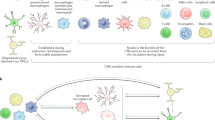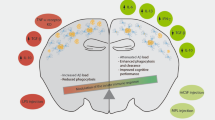Abstract
It has long been known that the brain is an immunologically privileged site in normal conditions. Although the cascade of immune responses can occur as long as there is a neuronal injury or a potent immune stimulation, how the brain keeps glial cells in a quiescent state is still unclear. Increasing efforts have been made by several laboratories to elucidate how repression of immune responses is achieved in the neuronal environment. The suppression factors include neurotransmitters, neurohormones, neurotrophic factors, anti-inflammatory factors, and cell-cell contact via adhesion molecules or CD200 receptor. This review discusses how these factors affect the cascade of cerebral immune responses because no single factor listed above can fully account for the immune suppression. While several factors contribute to the suppression of immune responses, activation of glial cells and their production of pro-inflammatory factors do occur as long as there is a neuronal injury, suggesting that some neuronal components facilitate immune responses. This review also discusses which signals initiate or augment cerebral immune responses so that stimulatory signals override the suppressive signals. Increasing lines of evidence have demonstrated that immune responses in the brain are not always detrimental to neurons. Attempt to simply clear off inflammatory factors in the CNS may not be appropriate for neurons in neurological disorders. Appropriate control of immune cells in the CNS may be beneficial to neurons or even neuroregeneration. Therefore, understanding the mechanisms underlying immune suppression may help us to reshape pharmacological interventions against inflammation in many neurological disorders.
This is a preview of subscription content, access via your institution
Access options
Subscribe to this journal
Receive 12 digital issues and online access to articles
$119.00 per year
only $9.92 per issue
Buy this article
- Purchase on Springer Link
- Instant access to full article PDF
Prices may be subject to local taxes which are calculated during checkout
Similar content being viewed by others
Author information
Authors and Affiliations
Corresponding author
Rights and permissions
About this article
Cite this article
Chang, RC., Chiu, K., Ho, YS. et al. Modulation of Neuroimmune Responses on Glia in the Central Nervous System: Implication in Therapeutic Intervention Against Neuroinflammation. Cell Mol Immunol 6, 317–326 (2009). https://doi.org/10.1038/cmi.2009.42
Received:
Accepted:
Issue Date:
DOI: https://doi.org/10.1038/cmi.2009.42
Keywords
This article is cited by
-
Role of Oxidative Stress in the Occurrence and Development of Cognitive Dysfunction in Patients with Obstructive Sleep Apnea Syndrome
Molecular Neurobiology (2023)
-
Immunomodulator CD200 Promotes Neurotrophic Activity by Interacting with and Activating the Fibroblast Growth Factor Receptor
Molecular Neurobiology (2016)
-
Anti-Inflammatory Efficacy of Dexamethasone and Nrf2 Activators in the CNS Using Brain Slices as a Model of Acute Injury
Journal of Neuroimmune Pharmacology (2012)
-
Curcumin Inhibits LPS-Induced CCL2 Expression via JNK Pathway in C6 Rat Astrocytoma Cells
Cellular and Molecular Neurobiology (2012)
-
Neuroimmune Pharmacology from a Neuroscience Perspective
Journal of Neuroimmune Pharmacology (2011)



